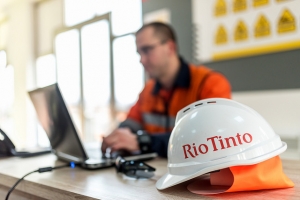


(Posted on 27/09/19)
Rio Tinto, one of the world’s largest iron ore producers, has signed a Memorandum of Understanding (MOU) with China’s largest steel producer, China Baowu Steel Group and Tsinghua University, one of China’s most prestigious and influential universities (the Parties), to develop and implement new methods to reduce carbon emissions and improve environmental performance across the steel value chain. The China Iron and Steel Association (CISA) invited the Parties to sign the MOU at its China International Steel and Raw Materials Conference held in Qingdao.
The MOU will enable the formation of a joint working group tasked with identifying a pathway to support the goal of reducing carbon emissions across the entire steel value chain, which accounts for between seven and nine per cent of the world's carbon emissions.1 The working group will establish a joint action plan on how to best utilise the Parties’ complementary strengths in research and development, technologies, processes, equipment, logistics, industry coordination and policy advisory capacities to combat climate change and improve environmental performance.
Rio Tinto chief executive, J-S Jacques said "This pioneering partnership across the steel value chain will bring together solutions to help address the steel industry's carbon footprint and improve its environmental performance.
"The materials we produce have an important role to play in the transition to a low carbon future and we are committed to partnering with our customers and others to find the most sustainable ways to produce, process and market them. We are already doing this in aluminium and now, through this partnership, we will be doing it in the steel industry.
"We thank CISA for its support and look forward to collaborating with China's largest steel producer, China Baowu, and Tsinghua University, a global leader in climate change research and collaboration."
China Baowu chairman, Chen Derong said "China Baowu is committed to ecological and sustainable development.
We will promote sustainable production through intelligent manufacturing. We want to make a difference to the iron and steel ecosystem by developing greener factories and enterprises to deliver a cleaner, more sustainable steel industry. China Baowu looks forward to exploring low-carbon metallurgical innovation with Rio Tinto and Tsinghua University, and building a low-carbon industrial value chain. We hope to jointly address climate challenges with our partners, and create a model of harmonious coexistence between cities and steel mills."
Tsinghua University Vice President You Zheng said "Tsinghua is committed to providing solutions to climate change challenges and contributing wisdom to sustainable development. Initiating the Global Alliance of Universities on Climate is an important milestone, and just one example. The signing will enable us to work closely with the upstream and downstream of the steel industry value chain to jointly find the solution to the industry's low carbon transformation."
ADM and Bayer have announced a three-year extension of their partnership to support farmers in Maharashtra... Read more
The National Grain and Feed Association (NGFA) has applauded Senator Deb. Fischer’s (R-Neb.) reintroduction... Read more
Anglo American plc and Teck Resources Limited have received regulatory approval from the Government... Read more
The Rhodes Ridge Joint Venture has approved a $191 million (A$294 million) (Rio Tinto share $96 million... Read more
Trafigura Group Pte Ltd, a global leader in the commodities industry, has announced its financial results... Read more
Rio Tinto has successfully produced the first copper from the Johnson Camp mine in Arizona using its... Read more
The American Soybean Association’s World Initiative for Soy in Human Health programme and the... Read more
Karlka Nyiyaparli Aboriginal Corporation (KNAC) Registered Native Title Body Corporate and Rio Tinto... Read more
OCI Global, a leading global producer and distributor of nitrogen products has announced that it has... Read more
In December 2024, SSAB was granted a permit by the Land and Environment Court at Umeå District... Read more